Beaming and wearied, her voice faltering, Dilma Rousseff stepped up to the microphone at the packed hotel auditorium in Brasilia and paused. She had just shoehorned victory from Brazil’s closest presidential contest on record, beating Social Democrat Aecio Neves by 3.4 million votes out of more than 110 million cast, but you’d never have known how close it was by the militantes’ war whoops.
These might be the last “oles” she’ll hear for a while. Brazil’s economy is in a ditch, inflation is 6.75 percent, running two points above target. Unemployment is low, not because of an opportunity bonanza but a shrinking labor pool as idled workers give up job hunting.
Rousseff will have to steward all this alongside an even more splintered Congress (with 28 parties, up from 22), an emboldened opposition (with Neves in the lead) and a creeping corruption scandal at the nation’s giant oil company. Sunday’s election may be history, but from now on, every day is Monday in the federal courtroom hearing the case.
No doubt this was what Rousseff had in mind when, after 10 minutes of partisan swagger, she played the unity card. “I don’t believe this election divided the nation,” she said, moments after her political mentor, former president Luiz Inacio Lula da Silva hoisted her hands in victory, Rocky-style. “Winning is about building bridges. … I am prepared for dialogue.” Magnanimity is the victor’s disclaimer, but not once in her 27-minute rambling victory lap did Rousseff mention Neves or acknowledge the vote that clove Brazil in two. Lula Inc. don’t do gracious.
What their Workers’ Party does do is power, and this is where Rousseff’s victory could sour. It’s not just the widening of the congressional aisle she must reach across. The hazard lies in her own court. Rousseff sits astride a nine-party coalition, where the appetites for patronage and power are now sharper.
Until now, the ruling PT has kept its junior partners at bay by growing ministries, scattering second-tier posts but keeping core jobs for the homies. The PT currently controls 15 of 39 Cabinet posts, leaving just five to the Brazilian Democratic Movement Party, the largest party in the legislature. That arrangement has sparked resentment among allies and repeated rumblings of mutiny.
That explains why Rousseff filled her victory speech with hosannas to the alphabet soup of coalition partners but also to Lula. Rousseff’s political godfather is widely seen as having rescued her struggling campaign in the home stretch and will likely be leaning in for the next four years.
If keeping the patchwork together was headache enough when the PT won big at the polls, it has just gotten worse. Rousseff ‘s 3.2 percent margin of victory was the tightest of any Brazilian president since 1894, according to O Globo.
Brasilia isn’t her only worry. Thanks to the PT’s aggressive spin men, the 2014 race split Brazil in two along a red-states (for Rousseff), blue-states (Neves) meridian of class, clout and culture. To the north and northeast is solid Rousseff territory: poor, less educated, more rural and beholden to government assistance. The “reddest” regions, where she took over two-thirds of the vote, jibe tidily with the map of beneficiaries of Bolsa Familia, the government’s marquee cash transfer program.
To the south lies the opposition stronghold, a handful of states where silos and smokestacks dominate the skyline, kicking in 62 percent of Brazil’s $2.4 trillion gross domestic product. Ground zero of the anti-Dilma vote is São Paulo, the country’s wheelhouse, where Neves took two-thirds of the 30 million ballots.
This tropical Mason-Dixon line has little to do with the ideological civil war that Rousseff’s campaign men started. But Rousseff should take note. She won a tight reelection among voters fractured by discontent, with the tricky narrative of change through continuity. Now she will have to sell austerity as healing. If she slips up, Lula will have her back, with a hand on her shoulder and an eye on 2018.
Bloomberg View contributor Mac Margolis is Brazil bureau chief for Vocativ.
© 2014, Bloomberg News






